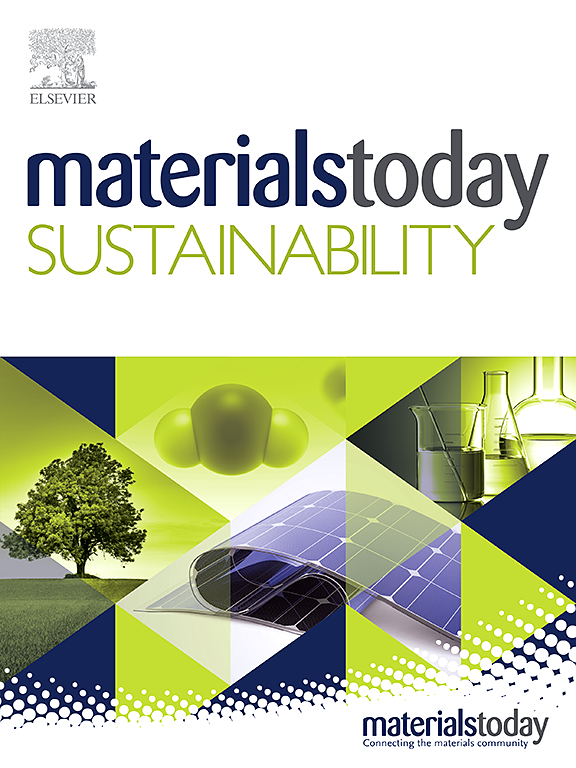Enhancing the sustainability of microalgae cultivation through biosensing technology
IF 7.9
3区 材料科学
Q1 GREEN & SUSTAINABLE SCIENCE & TECHNOLOGY
引用次数: 0
Abstract
This comprehensive review shows that environmental challenges such as high water demand, high nutrient requirements, and energy-intensive nature of microalgae cultivation system must be addressed to fully realise sustainability. These challenges can be linked to problems such as water scarcity, nutrient pollution, and increased greenhouse gas emissions, which affect the sustainability of microalgae cultivation systems. The use of biosensing technology in microalgae cultivation systems is an emerging method that will advance the field of microalgae cultivation by providing real-time, precise monitoring and control of various cultivation parameters. This review critically investigates the prospects associated with the use of this technology in microalgae cultivation systems. The recent advances in biosensing technology, such as the development of highly sensitive and specific biosensors for detecting key metabolic indicators, environmental parameters, and growth conditions, were linked to the sustainability of microalgae cultivation systems. The review buttressed innovations such as lab-on-a-chip devices, nanotechnology-based sensors, and non-invasive optical sensing techniques which have been used to enhance the ability to monitor and optimise microalgae growth, productivity, and biochemical composition. The review also emphasises the role of emerging technologies such as artificial intelligence (AI), machine learning (ML), and the Internet of Things (IoT) in microalgal cultivation systems. These developments have the potential to enhance real-time data analysis, optimise cultivation strategies, and improve overall system efficiency. The review shows that despite the role of biosensing technology in microalgae cultivation systems, progress is limited by challenges that include accuracy and reliability, sensitivity, specificity, long-term stability, and integration with cultivation systems. The integration of AI, ML, IoT, and other biosensing technologies has the potential to address these challenges by providing more accurate and reliable data analysis, enhancing sensitivity and specificity, improving long-term stability, and seamlessly integrating with cultivation systems.
利用生物传感技术提高微藻养殖的可持续性
综合分析表明,要充分实现微藻的可持续性,必须解决微藻养殖系统的高需水量、高养分需求和能源密集型等环境挑战。这些挑战可能与水资源短缺、营养物污染和温室气体排放增加等问题有关,这些问题会影响微藻培养系统的可持续性。生物传感技术在微藻培养系统中的应用是一种新兴的方法,通过对各种培养参数进行实时、精确的监测和控制,将推动微藻培养领域的发展。本文综述了该技术在微藻培养系统中的应用前景。生物传感技术的最新进展,如用于检测关键代谢指标、环境参数和生长条件的高灵敏度和特异性生物传感器的发展,与微藻培养系统的可持续性有关。这篇综述支持了诸如芯片实验室设备、基于纳米技术的传感器和非侵入性光学传感技术等创新,这些技术已被用于提高监测和优化微藻生长、生产力和生化组成的能力。该综述还强调了人工智能(AI)、机器学习(ML)和物联网(IoT)等新兴技术在微藻培养系统中的作用。这些发展具有增强实时数据分析、优化种植策略和提高整体系统效率的潜力。综述表明,尽管生物传感技术在微藻培养系统中发挥了重要作用,但其进展受到准确性和可靠性、敏感性、特异性、长期稳定性以及与培养系统集成等挑战的限制。人工智能、机器学习、物联网和其他生物传感技术的集成有可能通过提供更准确、更可靠的数据分析、提高灵敏度和特异性、提高长期稳定性以及与种植系统无缝集成来解决这些挑战。
本文章由计算机程序翻译,如有差异,请以英文原文为准。
求助全文
约1分钟内获得全文
求助全文
来源期刊

Materials Today Sustainability
Multiple-
CiteScore
5.80
自引率
6.40%
发文量
174
审稿时长
32 days
期刊介绍:
Materials Today Sustainability is a multi-disciplinary journal covering all aspects of sustainability through materials science.
With a rapidly increasing population with growing demands, materials science has emerged as a critical discipline toward protecting of the environment and ensuring the long term survival of future generations.
 求助内容:
求助内容: 应助结果提醒方式:
应助结果提醒方式:


